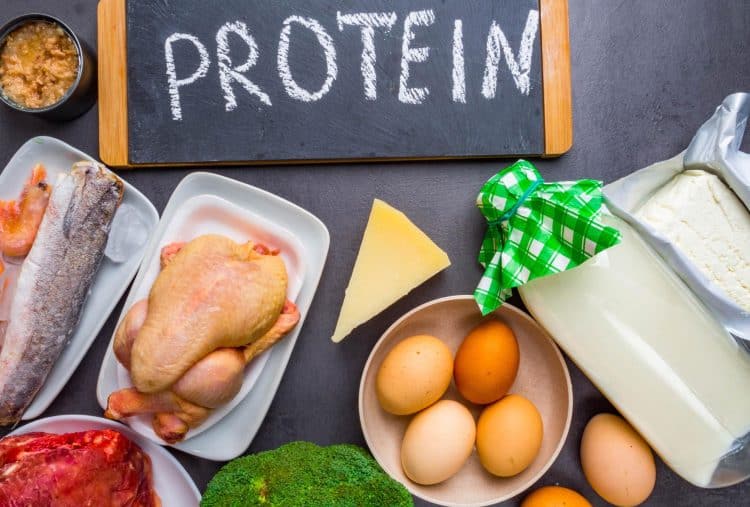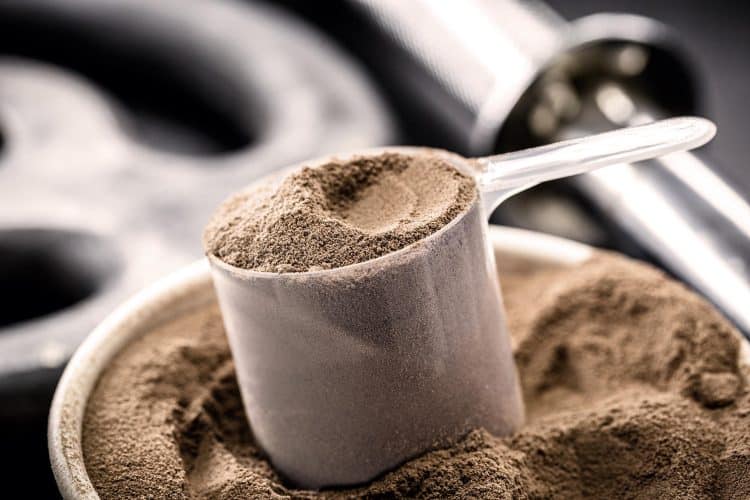Whether you are a beginner or an advanced lifter, you’ve probably woken up sore after an intense workout at some point or another.
While delayed onset muscle soreness (DOMS) can result from various factors, improper overnight muscle recovery is one of the most common reasons for the infamous nagging muscle tissue pain.
Make no mistake, optimal recovery isn’t just for preventing muscle soreness. It can help boost overall functionality and athletic performance, lower the risk of injury during training, and enhance overall health and well-being.
Remember, sleep is where all the magic happens. The body releases essential recovery hormones like testosterone and growth hormone while you’re sleeping, which facilitates muscle repair and growth.
The great thing about this recovery process is that you can optimize your results by using nutrition strategically before bed. In this article, I share five proven nutrition hacks that will help take your gains to the next level.
Hack 1: Don’t Fear Carbs

In my experience, many people avoid eating carbs at night for fear of gaining excess weight. However, this is nothing but a myth.
Carbs are your muscles’ primary source of energy. Your body breaks down carbohydrates into glycogen, which is used as energy. Your body taps into its stored glycogen reserves during exercise.
Eating high-quality carbs, especially after an intense workout and before bed, helps replenish the depleted glycogen stores. This process is especially important for optimal overnight recovery.
Not only does glycogen provide the energy needed for optimal physical performance, but it also contributes to the process of building new muscle tissue while you are sleeping.
A lack of glycogen will make you feel tired and sluggish throughout the day.
Simple versus Complex Carbs

There are two main types of carbs that you should know about — simple and complex.
Processed snacks and sugar drinks are examples of simple carbs. They will give you a quick buzz of energy but are usually followed by a crash. This phenomenon occurs because the simple sugars cause a rapid blood sugar spike followed by a quick drop.
On the other hand, complex cops, which are found in whole grains, fruits, and vegetables, offer a steady supply of energy throughout the day and night, helping with consistent recovery and preventing energy crashes.
To keep the blood sugar levels and energy release stable throughout the night, experts recommend eating whole grains (quinoa, brown rice, and oats), fruits (bananas, berries, and apples), and vegetables (yams, sweet potatoes, and leafy greens) in dinner. (2)
Use this calculator to determine your ideal daily carb intake goals.
Coach Tip: Pair the carbs with protein for a synergistic effect. The carbs will help shuttle protein into the muscles more effectively, maximizing muscle protein synthesis.
Hack 2: Embrace Healthy Fats
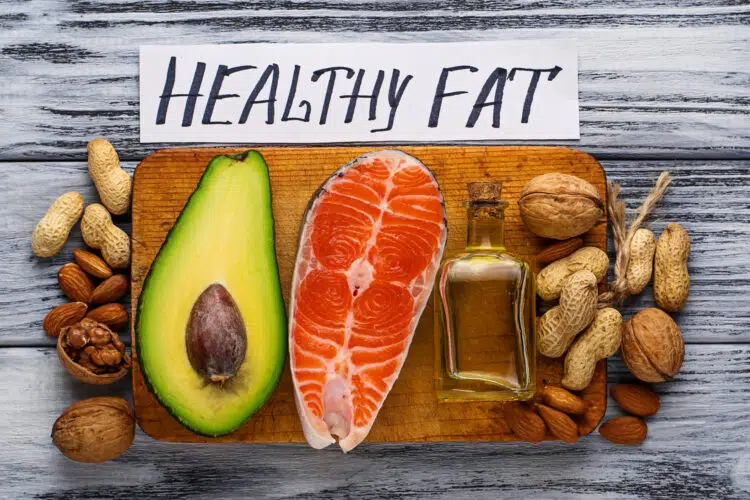
Many people wrongly consider dietary fats as their arc nemesis and the reason behind their stubborn love handles. Healthy fats are needed for several essential functions, like hormone production, cellular repair, brain function, and fighting inflammation.
That said, you must focus on unsaturated fat as the main dietary fat source in your diet. Unsaturated fat can be divided into two categories:
- Monounsaturated fats: They are known for their heart-health benefits and are found in foods like avocados, nuts, and olive oil.
- Polyunsaturated fats: These are packed with omega-3 fatty acids, which are essential for joint health and fighting inflammation. Fatty fish like salmon and tuna, as well as flaxseeds and walnuts, are packed with polyunsaturated fats.
How To Eat Fats at Night
There are several ways of including healthy fats into your nighttime routine, but my favorite method involves eating a handful of nuts before dozing off. I keep a container of almonds and cashews by my bedside for this, and it also ensures I don’t snack on something unhealthy when I’m starving. (3)
Another convenient method is to add a few slices of avocado to your evening salad. On the other hand, if you’re having a late dinner, opt for salmon or tuna to meet your daily fat intake goal.
Finally, if everything else fails, sprinkle some flaxseeds or chia seeds over your yogurt or oatmeal before bed.
Remember, eating healthy fats before bed won’t make you gain weight. In fact, they can help regulate your appetite and prevent late-night cravings.
Hack 3: Prioritize Protein
Protein is the building block of muscle and is the most important macronutrient if you’re aiming to build muscle mass. Consuming an optimal amount of protein boosts muscle protein synthesis (MPS), which is the process by which your muscles repair and grow bigger and stronger.
Remember, you break down muscle tissue while you are training in the gym. Your muscles grow bigger and stronger while you are resting. The muscle repair process is fueled by amino acids, which make up protein.
Research suggests consuming up to 2.2 grams of protein per kilogram of body weight to maximize muscle protein synthesis. (1)
Consuming an optimal amount of protein before hitting the sack ensures that your body will have a steady supply of amino acids throughout the night to enhance muscle during sleep. It can also significantly lower the occurrence of DOMS.
Types of Protein and Their Absorption Rates
Not all protein sources are created equal. Different protein types offer varying muscle growth potential due to their unique amino acid profiles and absorption rates. These are the three main types of proteins that you should know about:
- Whey: It is a byproduct of cheese production and one of the fastest digesting sources, making it highly effective for pre and post-exercise consumption.
- Casein: This is a slow-digesting protein source found in dairy products like milk, cheese, and yogurt. It releases amino acids into your bloodstream over several hours, making it the perfect protein source to consume before bed.
- Soy: One of the few plant-based complete protein sources that contains all essential amino acids. Soy can be a great choice for people who are lactose intolerant or vegan.
Ideal Protein Intake For Nighttime Muscle Growth
The optimal protein intake goal for you will depend on your unique lifestyle, activity level, and individual needs. However, experts generally recommend consuming 20 to 30 grams of protein before bed to promote muscle protein synthesis.
Best Food Sources For Bedtime Protein Intake
The great thing about protein is that you have enough options to choose from. Greek yogurt, cottage cheese, protein shakes, nuts and seeds, and lean meats are some of the most convenient protein sources you can have before hitting the sack.
This calculator will help determine the most optimal protein intake goal according to your goals.
Coach Tip: when choosing Greek yogurt or protein shakes, make sure you opt for sources that are high quality and low in sugar. Feel free to combine different sources to make your favorite recipes.
Hack 4: Supplement Strategically
Bedtime supplements are often a taboo subject. However, when done right, they can magnify your recovery and progress.
Before I get into the nitty-gritty of supplements, I must add that supplements must never replace nutrient-dense whole foods in your diet. Most of your daily macro and micronutrient intake should come through real food.
Nonetheless, here are a few supplements that you can add to your bedside table:
- Casein: The slow-digesting nature of this protein source makes it an ideal supplement to consume before bed to promote recovery and muscle growth. Plus, the thick texture of this supp will make you feel full and satiated throughout the night.
- Creatine: It is one of the most well-researched sports nutrition supplements. Creatine draws water into your muscles, which can speed up recovery and lower the occurrence of muscle soreness. (5)
A few other effective supplements include tart cherry juice, as it is packed with antioxidants and can help fight inflammation. Magnesium, on the other hand, can help your muscles relax and improve sleep quality.
Supplement Consumption For Optimal Recovery
Avoid going overboard with these supplements. The optimal dosage for each individual will vary depending on their current fitness levels and training objectives. Consult with a qualified nutritionist to determine the ideal intake for your unique needs.
Hack 5: Hydration is Key
Hydration is one of the most overlooked aspects of nutrition. Water is an essential nutrient required by the body to function optimally. Notably, water cannot be stored in significant quantities in the body, and you must continuously replenish it to ensure overall health and well-being.
An optimal water intake is non-negotiable for maintaining body temperature, nutrient delivery, and waste removal, which all play a crucial role in recovery.
The idle water intake for you will depend on various factors, like your gender, age, height, weight, energy expenditure, and activity level.
Experts recommend drinking half of your body weight in ounces of water per day. For instance, a 150-pound individual should aim for 75 ounces of water intake. If this sounds too complicated, use this calculator to determine the optimal water intake for your unique needs. (4)
Experts believe that drinking less than a gallon of water every day can lead to dehydration, which can result in negative health consequences like fatigue, headaches, dizziness, and declining cognitive abilities.
A lack of water can also cause an electrolyte imbalance. When your body is low on essential electrolytes like sodium and potassium, it can lead to a disruption in muscle function and nerve signaling.
Heavy sweaters should pay close attention to their daily water intake to lower the risk of muscle cramps, fatigue, and impaired performance.
I recommend drinking an electrolyte-infused drink after an intense workout to replenish the lost minerals.
How To Hydrate Before Bedtime
Many people avoid drinking water before going to sleep to prevent midnight bathroom trips. However, going to bed dehydrated significantly hampers your recovery potential and increases the occurrence of muscle soreness and the possibility of injury during intense training sessions.
Drink at least a glass of water before switching off the lights to ensure optimal nutrient delivery for overnight muscle recovery. You could also include chamomile, ginger, and valerian extracts in your glass to promote relaxation and improve sleep quality.
That said, avoid sugary drinks and alcohol before bed, as they can disrupt your sleep quality and hinder recovery.
Conclusion
Sleep is the prime time for muscle repair and growth. Eating a balanced diet of protein, fats, and carbs and ensuring optimal hydration before bedtime can boost recovery and help you achieve your dream physique.
Experiment with different bedtime diet routines to determine what works best for you. Tweak your diet intake until you hit the sweet spot. Using a supplement can make all the difference if you’re having a hard time recovering via a whole-food diet.
Remember, each individual has unique nutrition needs. You must learn to listen to your body and adjust your nutrition strategy based on how well you are recovering and feeling.
I highly recommend beginners seek an expert nutritionist’s help to design a personalized diet program. It might cost a little money upfront but will pay dividends in the long run.
If you have any questions about how you can implement the five nutrition tips explained in this article in your lifestyle, post them in the comments below, and I’ll be happy to help!
References:
- Wu G. (2016). Dietary protein intake and human health. Food & function, 7(3), 1251–1265. https://doi.org/10.1039/c5fo01530h
- Kinsey AW, Ormsbee MJ. The health impact of nighttime eating: old and new perspectives. Nutrients. 2015 Apr 9;7(4):2648-62. doi: 10.3390/nu7042648. PMID: 25859885; PMCID: PMC4425165.
- d’Unienville NMA, Hill AM, Coates AM, Yandell C, Nelson MJ, Buckley JD. Effects of almond, dried grape, and dried cranberry consumption on endurance exercise performance, recovery, and psychomotor speed: protocol of a randomized controlled trial. BMJ Open Sport Exerc Med. 2019 Aug 7;5(1):e000560. doi: 10.1136/bmjsem-2019-000560. Erratum in: BMJ Open Sport Exerc Med. 2019 Sep 3;5(1):e000560corr1. doi: 10.1136/bmjsem-2019-000560corr1. PMID: 31548903; PMCID: PMC6733316.
- Popkin BM, D’Anci KE, Rosenberg IH. Water, hydration, and health. Nutr Rev. 2010 Aug;68(8):439-58. doi: 10.1111/j.1753-4887.2010.00304.x. PMID: 20646222; PMCID: PMC2908954.
- Rawson, E. S., Conti, M. P., & Miles, M. P. (2007). Creatine supplementation does not reduce muscle damage or enhance recovery from resistance exercise. Journal of strength and conditioning research, 21(4), 1208–1213. https://doi.org/10.1519/R-21076.1
Tip: If you're signed in to Google, tap Follow.



